-
Content Curation For Newbies: 3 Easy Steps To Build Your Content Strategy
âIâm a firm believer in the notion that editorial judgment augments automated search. It makes all the difference between curation and aggregation strategies, and readers can tell.â Â
Michael Kolowich
Â
Â
We have been thinking a lot about how we connect with our clients, what content we create and curate, and how we share it. It seemed such an easy task at first - we havenât considered we would need to create a special strategy for this sort of things.
Â
Social media and communication should be fun, why bother, but we have to admit, having made some mistakes, you should bother, although content curation can still be fun.
Â
What is content curation and why bother?
Â
Content curation basically includes monitoring news outlets, mass media, social media, blogs or other information resources to select and share the most valuable information with your followers, customers or subscribers.
Â
When they say that technology must give 'unlimited possibilities' to everyone, they never explain how normal people should be dealing with all that ever-growing ocean of user-generated content of all sorts and keep themselves sane (just think about this single fact: 300 hours of video are uploaded to YouTube every minute!).
Â
It leads to a higher competition between content producers, and also a higher role of content curators who are in charge of helping people to get only the best content out of everything we can find online, including audio podcasts, youtube videos, various blogs and posts in social networks.
Â
You may need to include content curation into your content marketing strategy when you want to:
- Build better connection with your customers and get better engagement
- Save time from creating duplicate content
- Build important links with other professionals
- Become an authority in your industry
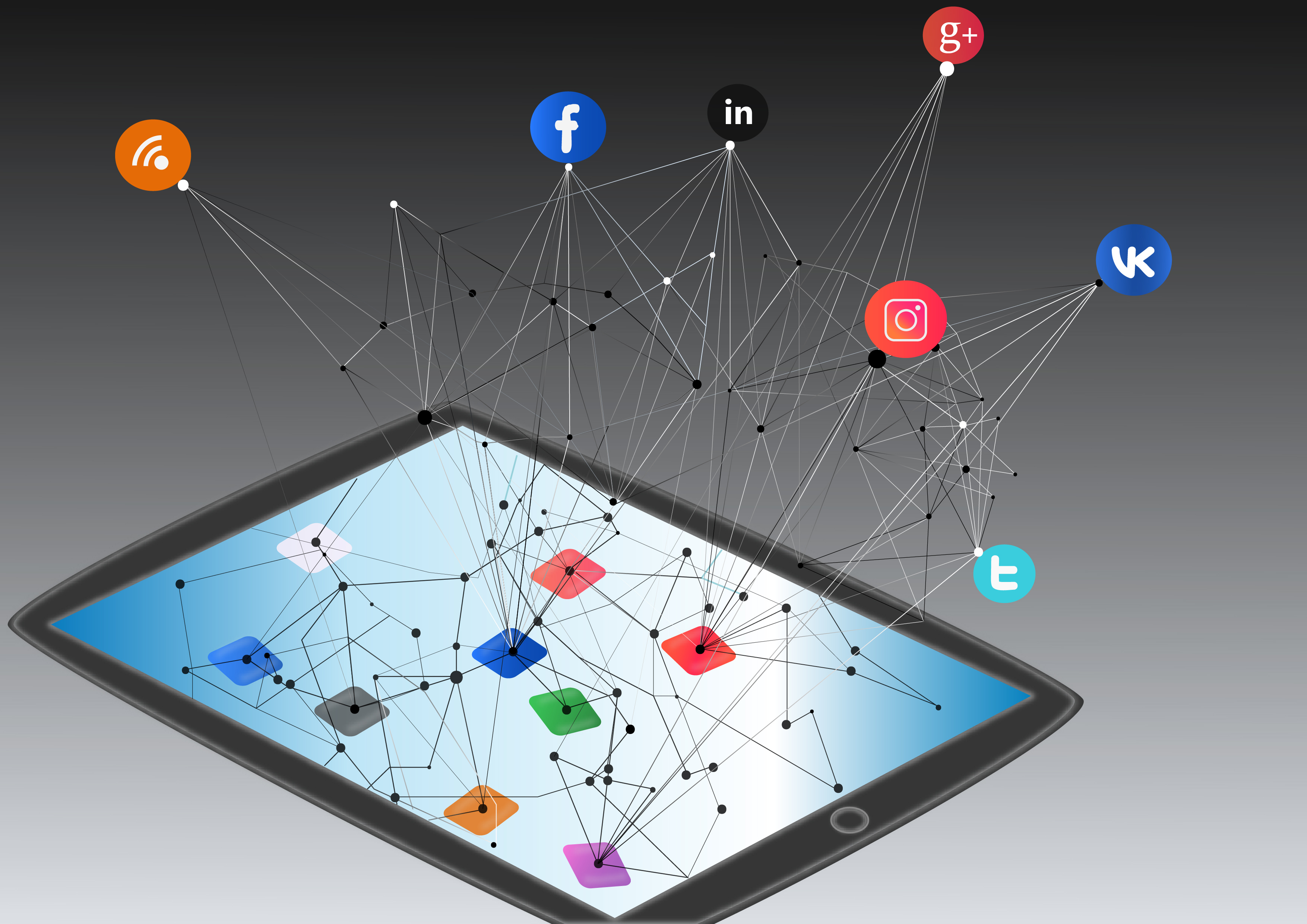
Â
A simplified guide to content curation for everyone
Â
It usually takes 3 steps to curate content:
Â
Step #1: Content Exploration
Â
This stage takes the lion share of the time you will spend curating content: your task is to search for the best content to deliver to your subscribers. Usually, you have to look through endless dozens of resources till you find truly valuable content.
Â
To be effective without spending day and night browsing and scrolling, Â youâd better set the time limit from start as well as limit the number of sources you will need to look through: something between 20 and 30 sources is more than enough to cover all topical and valuable content.
Â
It is a must do for any content curator to build their own basic list of writers, bloggers, websites, and just outstanding people to follow in the same business area.
Â
We at Feedreader can share a bit of our personal experience: using RSS subscriptions helps us to monitor major news feeds and marketing blogs, also we use Twitter and Facebook to follow influential people in our area of interests.
Â
How do you select the sources?
- Identify your target audience
- Understand what your and your audience's key values are
- Define what message you want to send to your audience
- Look for the sources (sites or online influencers) which share the same values and help you deliver your message.
Â
The next task is to choose the info to make a connection with your customers and improve communication with them. A selected story should be meaningful and unique - thatâs why people are following someone: they come to get exclusive and powerful content. Nobody wants to look through the same replicated info 10 times a day, but for you, as a content curator, thatâs part of the job.
Â
The process of exploration means digging deeper than other people normally would as the most precious things usually lie below the surface: it would be really great if you could find some secret sources of yours - resources or people that are not yet popular but provide trustworthy and high-quality stories (tips, insights, or whatever you call it).
Â
If you are specific about what you are creating and sharing, people would wait for your meaningful posts instead of just briefly scrolling through them. It will make you feel confident that the handpicked content you are sharing stands out from mediocre and duplicate.
Â
While exploring you should pick up the best articles out there, preferably, make a list of them to revise it later. You may use Pocket or Evernote for this purpose (by the way, Pocket has great ârecommended contentâ feature) and then you choose the best of those great articles you have already chosen, to share with your audience.
Â
Step #2: Reading Â
Â
You should accept, and always remember, that if you share a piece of information under your brandâs identity, people will associate you with it (and vice versa) and probably believe in it just because they trust/like your brand or company (so the responsibility is very high).
Â
If a story you share is fake or dull, then it will cast a shadow over your brand making it look fake and dull too.
Â
That's why it is something more than just an obvious and a must-do thing - it means putting your signature under the story you share, giving it your brandâs vote of recommendation, so there is no room for failure.
Â
Sharing something you havenât rigorously read, is insane, like opening Pandora's box - it might screw up your brandâs reputation at a time!
Â
Great content curation includes participation: if you read the info and take responsibility for what you are posting, people will confide in you and respect you for that.
Â
Step #3: Sharing
Â
Seemingly easy, this stage is vital: the way how you share it will impact the final usersâ reaction to the post. It should be personified and include a catchy annotation with your experience and emotions: your attribution must explain why you paid attention to the content and why it deserves your customersâ attention.
Â
Is it valuable, is it funny, is it unique? In case you partially disagree with the original source, make it clear in your post - highlight the ideas that appeal to you and your brand (and also those you disagree with).
Â
Ask questions, answer the comments, let your posts become an opportunity for users to express their thoughts. Gradually you will find the way to talk to your audience creating and curating impactful content that encourages dialogue.
Â
You can use scheduling software like Hootsuite, Buffer or other post planners to customize your social media content.
Â
If you have something to add, or if you are interested in more posts about content curation tips and insights, leave your comments here and we will dig deeper.
-
How to beat angry Writer's Block knocking on your door
 âCreative people do a lot of trial and error and rarely know where they are going exactly until they get there.â
Scott Barry Kaufman
 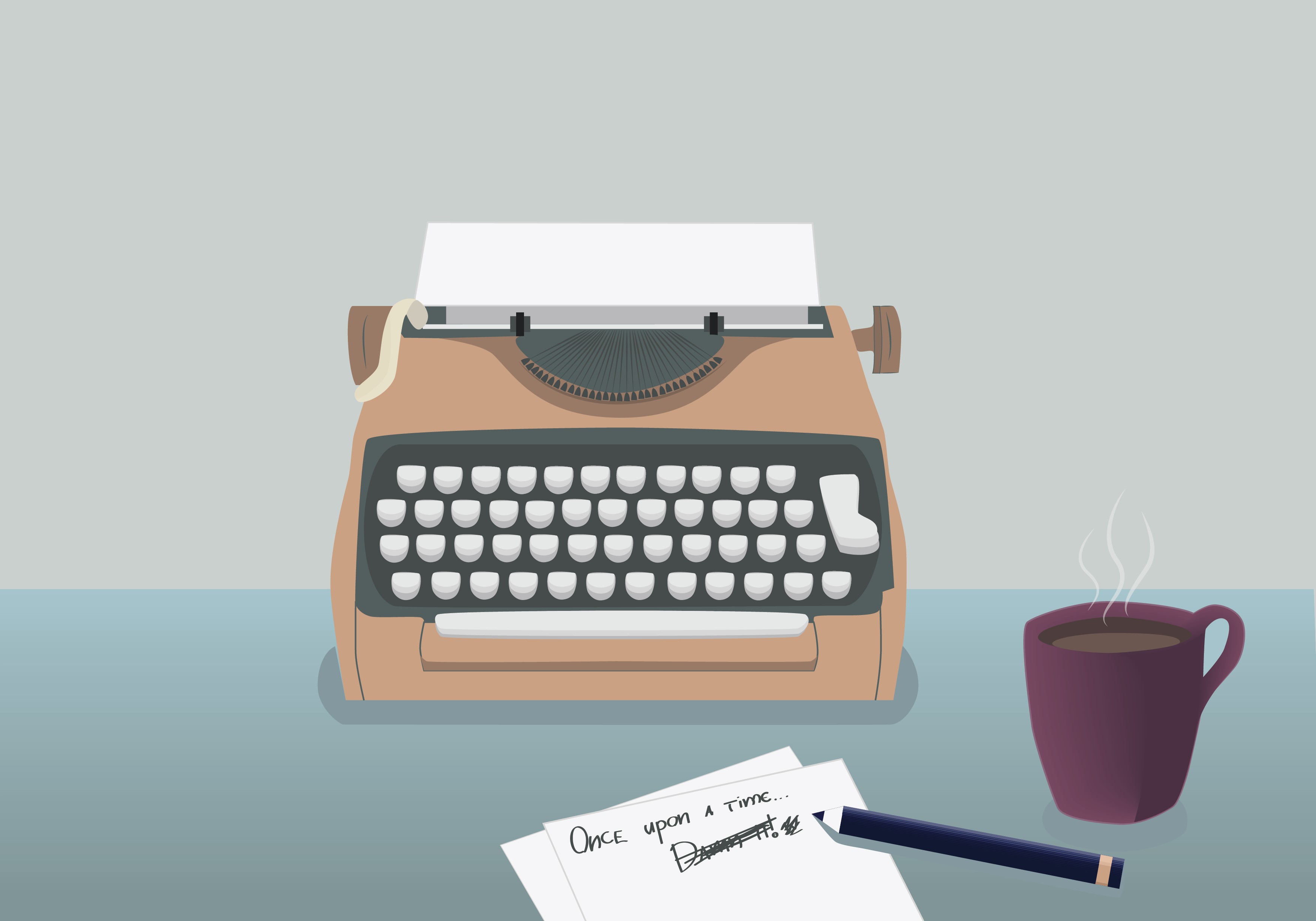
Â
This one time we are going to tell you a story about a blocked writer. There lived a guy called Tom. He had a passion for writing and enjoyed all the pleasures of it till the very moment he was hit by this evil force usually known under the name of Writerâs Block. Tom has heard about it but never met the creature himself. He turned to historical mentions of the mysterious Block and found out that Block existed a long time before it was even given the name. It tortured poor writers and made them feel miserable and self-doubtful.
Â
Once successful and productive they couldnât write a word. âOh my God, - poor Tom thought. The beast has come for me. What can I do now? Google help me!â Usually, it does. Tom was amazed how many techniques and strategies to beat Writerâs Block were invented. He read them one after another and started drowning in the letters H-O-W-T-O.
Â
He started shaking in fear dreading that he would never ever write a word. Although, some Block beaters suggested to write any words that come to your mind to win the battle. So Tom finished the evening with five pages filled with word âwordsâ and nothing else. âTomorrow is another dayâ, he thought and went to bed. He was having bad dreams struggling with unbeatable Writerâs Block all night long.
Â
Tomâs story is typical for many of those whose work involves writing (it doesn't matter whether you write a serious novel, school essay, or a short post for your blog). Coleridge, Joseph Mitchell, Mark Twain, and many more famous writers, poets and journalists had to face writerâs block (you may also call it a creative slowdown or burnout) and some of them just couldn't find the way out. Were they not talented enough or persistent enough, what are the reasons for creative block and does it exist at all? Maybe all these writers, bloggers or journalists were kind of lazy or untalented?
Â
Thatâs what we are going to find out in this article.
Â
A brief history of blockage
Â
Approximately since the Age of the Enlightenment, literacy began to spread wider, and so did the writerâs block (writing was no longer an occupation of a limited circle of scholars and clergy).
Â
Before the early nineteenth century, writing was mostly considered as an instrument of a rational, moralistic or naturalistic research (for example, French Encyclopédistes who wanted to describe literally everything in the World). With Romanticism came another generation of writers who preferred focusing on their inner emotional or imaginary experience: from that moment the writing process involved magic and an author demanded a muse for inspiration.
Â
Due to the increasing popularity of French symbolism in the beginning of the nineteenth century, the writerâs image was that of a deep, clever but miserable person. Arthur Rimbaud is one of the most famous and tragic depictions of the said lifestyle.
Â
âThe idea is to reach the unknown by the derangement of all the senses. It involves enormous suffering, but one must be strong and be a born poet. And Iâve realized that I am a poet. Itâs really not my fault.â
Â
He wrote most of his revolutionary poems between the age of sixteen and twenty and gave up poetry to become a trader (itâs hard to say why, but allegedly it might have been because of a lasting writer's block). Rimbaud did a lot of things that were considered inappropriate those days. The young man was involved in a relationship with a married poet Paul Verlaine, he showed little or no respect towards his confreres and even bullied them publicly, drank a lot and smoked weed trying to find inspiration. When he was nearly twenty Rimbaud gave up his old habits, broke up with Verlaine and stopped writing. He died of bone cancer when he was thirty seven, a successful tradesman and a former rebellious poet.
Â
Productive writers were perceived as shallow, although the nineteenth century gave the world plenty of masterpieces written by successful authors who had their very own recipes to rebuff the writer's block (Hugo, Trollope and many others). Trollope wrote in his autobiography: âLet their work be to them as is his common work to the common laborer.â He woke up every day to write strictly between 5.30 and 8.30 am and then went to his job at postal service. This schedule helped him write forty-nine novels in thirty-five years. Victor Hugo had quite an extravagant approach towards procrastination: he asked his valet to hide all his clothes so that he would stay at home and write.
Â

Â
After The Second World War American authors were deeply interested in psychoanalysis. They were investigating human nature taking as an example their own lives. Constant dealing with their past negative experience, or poetically speaking, fighting their inner demons led them to stress, burnout, and later to neuroticism and addictions. Scott Fitzgerald, Ernest Hemingway, and William Faulkner were among the famous after-war writers suffering from both alcoholism and writerâs block. According to W.Barrett, the modern writer was by definition an "estranged neurotic". No wonder psychologists found these cases interesting for their future studies.
Â
The term itself was first introduced by a psychologist Edmund Bergler in 1950s. He conducted a research called âDoes Writerâs Block Exist?â and found out that people experiencing writer's block were actually blocked psychologically and needed therapy to âunblockâ.
Â
According to Jerome Singer and Michael Barrios who conducted their research in the 1970s, all blocked writers were unhappy. They experienced depression, anxiety, increased self-criticism and reduced excitement and pride at work. They also showed signs of obsessive-compulsive disorder such as repetition, self-doubt, procrastination, and perfectionism. They felt helpless and isolated. What interests us most, the psychologists found out that all blocked writers were blocked for different reasons and to a different degree thus should have been treated differently according to their specific needs.
Â
The literary trends keep changing and so does the attitude to the writerâs block. Today scientists focus on brain chemistry and biological theories while psychologists rely on cognitive-behavioral therapy to remove fear of fail, disavowal or criticism. So we move on to find out how to identify our specific needs and stop procrastinating.
Â
What makes you blocked and how to unblock?
Â
Everyone wants to do something with their life, and we don't all get the opportunity because shit gets in the way.
Adele
Â
Now that we know that unhappy writers are unhappy in a variety of ways, it is vital to identify the causes of writerâs block and find the one that stands between you and the pleasure of being a prolific author. When you understand the core problem it is much easier to fight the monster. One may feel a bit distressed by the amount of advice jumping out of the numerous articles and we still donât have a sole solution to the problem because it simply does not exist.
Perfect Draft Syndrome
One of the most popular causes of writerâs block is chaos in the prewriting stage also known as 'perfect draft syndrome'. Creative thoughts and ideas may overwhelm you mixing with everyday problems and routine tasks, so you just canât work it all out.
Â
Consider free writing: put everything that comes to your mind on paper or in the doc without trying to control the stream of consciousness - just type/write it down. Drafts donât have to be perfect, so donât pay attention to misprints and mistakes at all at this stage - you can do it later on. This applies to structure as well. You just need to set your mind free from all of the thoughts struggling to come out of you.
Â
Fear of taking a risk
Inexperienced authors often are anxious of revealing themselves and afraid  that it might be too hard to get over public rejection. You know that it's OK because we all are human beings, we are afraid of numerous things like spiders, snakes or even hedgehogs, not to mention heights or depth that you may show or not show in your work.
Â
Adress your writing to somebody who will surely accept you (it can be even an imaginary friend), you can start with words âDear, [Friend], âŠâ and continue your narration with comfort. You can actually show your work to the said person later and ask for advice if needed. You need to come through failures and mistakes, as they are a part of learning.
Â

Previous success aka Second Novel Syndrome
Â
Fear of being judged is natural, as Elizabeth Gilbert, the author of bestseller âEat Pray Loveâ stated in her speech: âAnything that I write from this point forward is going to be judged as the work that came after the freakish success of my last book.â
Â
It is terrifying. Today you are successful writer or blogger, and tomorrow you just have to be even more successful and talented. God, itâs a heavy burden! Harper Lee hadnât written anything after her magnificent âTo Kill a Mockingbirdâ. Not a story. This is sad that the pressure of being judged makes talented people who love their job stop. So you donât have to. It is extremely likely you wonât get as much attention or positive reviews as you got before, because thatâs how it generally works.
Â
Remember why you are into writing. Thatâs because you are talented, thatâs because you love writing, it is your choice and it has little to do with other people's opinions in fact. You need to stop associating yourself with social acceptance and start writing for the sake of writing. Remember that Modernists refused to address their art to the audience's basic needs so you can follow their footsteps.
Â
Judging vs. generating ideas
Common problem that originates from extreme self-criticism, is when an author canât move on with writing being stuck with editing and criticising their own text for being unoriginal or dull. Donât judge yourself too much. Be yourself, don't try to sound smart or pretentious.
Â
Donât strive to be original either. There is nothing new under the sun, remember that? Being yourself is the hardest task of all but  itâs a sole way to originality. Reread your best posts to return to yourself, and leave the tasks of editing and polishing for the final part of your writing process,  so it cannot interfere with your initial ideas.
Â
Inability to incubate ideas, lack of inspiration
Writing as any other creative process is nonlinear, and sometimes one canât understand where had all their previous ideas come from. Like the ancient Greeks or new age Romantics you suffer and wait for the muse to come. Sometimes, your imagination needs to be recharged: consider brainstorming and thought-provoking exercises (for example, imagine an interview with a great writer of your choice, and ask him/her for opinion, what would they start with?). Â Changing the environment or switching activity might work as well: do some house work, go to a bookstore, go out to sketch, take a long walk or travel.
Â
Change your writing place or tools: switch from a pen and paper to a tablet or typewriter (or vice versa), change background color or font in your text editor. Take inspiration from movies and books, visit museums or exhibitions, read your favourite poems aloud, go to the theatre, - your creativity needs some outer sources to be nourished. Â
Â
WRITER'S BLOCK - A Supercut from Ben Watts.
Â
Unrealistic demands and perfectionism
Perfectionism leads to impossible writing goals, so your goals should be realistic and reachable and tasks should be manageable. You can search for the perfect solution for years, so take the first reasonable one. Life is imperfect so why on earth should your opus embody an unattainable level of perfection?
Â
The absence of agreed writing time. Procrastination
For people tired of monotony and routineness, a bit of chaos can be just what doctor ordered, but most of us are not really disciplined. Reading Stephen Kingâs novels one canât say heâs a bore by any means, but he advises to write every day at a fixed time no matter what. Although thatâs easier said than done, Â the results of scheduled writing may greatly impress you. Â
Â
Remove all distractions, switch off your devices and prepare tools necessary for writing - get yourself comfortable and show up every day at the same time even if youâre afraid that the muse will come in the middle of the night. Hereâs what Tom Waits did when the muse visited him while he was driving and couldnât write anything down. He addressed the sky: "Excuse me, can you not see that I'm driving? Come back in a more appropriate moment. Go bother Leonard Cohen".
Isolation
Unfortunately, pop culture often depicts writers as  mentally unstable people, alcoholics or drug addicts. Such myths along with other fears are overwhelming creative people and make them feel misunderstood and isolated. Thatâs why many writers generally don't like talking about their creative problems or their work with others, so they may become stressed out or even depressed. If you believe itâs your case, then you should try participating in social writing groups, it involves writing with others in the room so you will not be alone anymore. You may be interested in class and group discussions, which are useful not only for your work but for socializing as well. If you are afraid of new people, donât be scared to request for help of your colleagues and close friends at first.
Â
The pressure to produce work against natural inclination, lack of motivation
Often it takes efforts to write about some things you are not interested in or when you donât feel creative, but itâs your job, youâve got deadlines and you have to deal with it. Cheating works great: promise yourself freedom, for example, limit your writing time to 15 minutes or half an hour. In such a way you feel less pressure from the start, and thus itâs much easier to begin, but you may find yourself having been working for several hours later on. If the topic bores you to death, entertain yourself by doing weird but funny tasks, such as using particular words and phrases in each sentence or writing an article in a form of fairytale or horror story. (Actually, thatâs how the introductory part of this article was created, although the topic is fascinating, it helped to get started quickly). Promise yourself a treat after part of the work is done: it may be your favorite food, a night out in the movie, or something else pleasant and easily manageable.
Â
We call it magic: universal techniques for great writing
âInspiration exists, but it has to find us working.â
Pablo Picasso
Â
- Graham Greene kept a dream journal to overcome writerâs block. It helps writers get over internal and external judgment. Likewise, Morning pages dream diary helps to get rid of the fears of being judged or monitored. You can write everything you wish, all your joys and sorrows, your stream of consciousness doesnât demand structure or grammatical correctness. You donât have to show it to anybody, you just need to write regularly 3 pages a day. âPerhaps I shouldn't have been surprised at how powerful Morning Pages proved, from day one, at calming anxieties, producing insights and resolving dilemmas,â - Oliver Burkeman, a Guardian writer.
- Start in the middle of the sentence: âThe best way is always to stop when you are going good and when you know what will happen next. If you do that every day ⊠you will never be stuck. Always stop while you are going good and donât think about it or worry about it until you start to write the next day. That way your subconscious will work on it all the time. But if you think about it consciously or worry about it, you will kill it and your brain will be tired before you start.â â Ernest Hemingway
- Writerâs cube by Kim Keeline
Side 1: Decide what youâre writing about.
Side 2: What does your theme have in common with others? What are the differences?
Side 3: What does it make you feel?
Side 4: Consider all aspects of the topic. What field is it in, what does it consist of and how does it function?
Side 5: How does your writing impact others? Is it valuable for them?
Side 6: Find out all the pros and cons. Why is your topic worth writing about?
-
8 Biggest Reasons Your Website Needs RSS Feed
If a site does not offer an RSS feed, more often than not, they lose me as a reader and subscriber.
Devoted RSS user
Â
Some website owners are wondering whether they should have an RSS feed these days or is it better to follow with a regular newsletter? We gave it a thought and this is what we have to say about it.
Â
Despite the rumors that 'RSS is dead/dying' (the funny thing is that we have been constantly hearing this story for ten years or so), RSS feed still can be a content spreading and marketing tool of unparalleled functionality.
Â
Unfortunately, many site/blog owners decide not to syndicate RSS feeds on their projects at all, or hide RSS buttons away, giving higher priority to email or social media subscriptions (as they believe they are more efficient in some respect), and thus they provide their followers with less choice/freedom. Such website owners lose the opportunity to deliver their content in a convenient and user-friendly way. It is quite logical that site owners would better promote usage of RSS among their users, instead of rejecting it, as they can obtain some delicious benefits in addition to other existing channels.
Content spreading triangle: RSS + Email + Social Media
As the amount of content in social media is overwhelming, so the competition between businesses is severe, and the user attention span is short. Although social media are used by almost everyone, they serve different purposes than RSS readers: they are great at connecting people, but miss the mark when it comes to mass delivering of your business content to the users (unless youâre using paid options to promote yourself on Facebook or Twitter).
Â
There is a similar issue with the email newsletters: often a userâs inbox receives so much spam or other correspondence that the risk of your message to be deleted unread is pretty high. Moreover, real-life users are sick and tired of all those websites begging for their email addresses, so they may not appreciate another subscription that requires giving the personal info away.
Â
Thatâs why a good few users may find that getting site news via an RSS feed is a great alternative to hectic and cluttered social media feeds, or intrusive emails, as it allows them to check the updates in a more time-efficient and organized manner. With RSS reader a user can scan through the whole stack of a siteâs or blogâs headlines whenever he founds convenient, select what he is interested in, and follow the direct link to the original post if he wants to learn more.
Â
After all, RSS feed aggregators offer such features that most of social networks simply do not support: read/unread news status, private star/saves, and organizational folders.
Â
Here are some more reasons why RSS feeds are convenient and useful both for website owners and visitors.
Â
For site owners:
- A route to a wider audience: by not using RSS feed on your website, you narrow the marketing toolbox, and lose a free yet powerful instrument to build a stronger connection with the existing audience, or get a portion of newcomers - there are many RSS directories and catalogs out there, including Feedreader Observe, giving you more space for promotion.
- Unlike email newsletters RSS feeds can never be marked as spam (about 21% of emails worldwide fail because of spam reports). People tend to skip emails that are not their first priority as they are fed up with spam and rubbish, so your regular newsletter may automatically go to spam folder and never be read. Also, every bulk email provokes a number of spam reports sent to your provider, which a bit spoils your reputation and carries a variety of other risks. Â
- Less privacy concerns: Your visitors feel control over their information as they donât have to share it with other parties they cannot fully trust.
- RSS serves news, not ads or spam: it delivers your high quality content directly to users, without tricky medium or uncertainty. You can provide them with enticing ad-free post previews, and then invite visitors to continue reading on the website. All of this increases brand loyalty and is obviously good for your traffic.
- RSS makes following your website convenient for as many people as possible, while syndicating an RSS feed will cost you nothing - it is free and easy to set up (you may learn how to create RSS feed here).

For visitors:
- You don't have to share the email address and other contact info with every website you're barely interested in. As a result, you don't have to deal with email inbox clogged by spam or unsolicited emails, and there is a lesser chance that your personal details will be stolen by hackers or sold by a corrupt site owner.
- You can unsubscribe from any RSS feed any time you want in one click while it's not that easy with emails (we've all been there).
- Itâs easier to control the information you want to get. There's no need to look through dozens of inefficient emails after long weekends - you can easily switch between Feedreader Online categories for the content you need. You may check our previous article for more info about managing the incoming news flow and the risk of info overload. Comparing to social networks cluttered with disturbing ads, socially approved content or âsuggestedâ posts, RSS readers can keep their feeds clean and arranged chronologically, and thus get just the info theyâve intentionally chosen to get.
Â
We recommend that you never limit your âcontent spreading triangleâ, but youâd better jump at the opportunity to promote your project, articles, products, and services to a wider audience: social media are important in terms of user engagement, newsletters are convenient for some people, but RSS is still a great option for users that may never want to follow you on Twitter or subscribe to your newsletters.
-
Why is TRUMPery all around us: fake news fever, how to fight it, and whom to blame?
Thereâs nothing you canât write about now that people wonât believe.
Paul Horner, fake-news writer
Â
We live in the world where we get news nonstop. But is it actually the news we get? How can we be sure some piece of information is true while the Web provides everybody with an opportunity to be a reporter, political analyst, pro blogger, photographer, or an âexpertâ in any other field. Several studies have shown that 62% of Americans get the news from social media such as Facebook or Twitter.
Â
These platforms allow anybody to create fake news groups and pages almost indistinguishable from the real news outlets. The scheme is quite simple: fake-news makers build websites that imitate corporate styles, colours, and fonts of mainstream media, such as The New York Times or The Huffington Post, and fill them with loads of juicy content. Then, for example, Facebookâs algorithm recommends such news to the followers/readers of the said popular media. These articles are a pure clickbait, so the enticing headlines make 99% of their success, therefore they must be shocking, sensational or just hilariously improbable - something like this one: âBREAKING: Supreme Court To Nullify The Election⊠They Are Actually Doing Itâ.
Â
When you open such posts, they may look like the trustworthy newspaper articles, but in fact, they can be full of misinterpretation, farce, straightforward lies, or propaganda. This kind of writing has nothing to do with journalism at its best, as the real journalists adhere to higher professional standards and ethics. They are obliged to:
- tell the truth
- check the facts
- verify the sources they are representing in their articles or reports
Fake media have no such responsibility (and obviously no ethics): their only aim is to get more attention converted into clicks, likes, shares, etc, which means earning more money from ads, or more success in spreading some misbelieves. Most of the mainstream media cannot play by the same rules, and thus can never compete with the hoaxers that have no legal responsibility over the information they spread, but they had to adapt to not so fair algorithms of social media promotion in fear of losing their audience.
Â
According to The Pew Research Center, traditional journalism as we knew it before goes through a dramatic change: the digital era created new challenges for people of this profession, such as widespread of nontraditional outlets and digital-only media, increasing number of amateour/private reporters, and state officials producing their own newsfeeds. In this context, the existence of fake news puts us in a dangerous position where we can't simply rely on everything we see on the web, no matter how real it may look.
So what is the new meaning of TRUMPery?
2016 US election became a turning point that showed us how deep the pitfalls of the fake media influence can be. The fake news industry turned a group of ordinary Macedonian teenagers into prosperous businessmen - they organized a very successful fake media campaign to spread pro-Trump (and anti-Clinton) clickbait-type stories. Many of these baseless ânewsâ went viral on social media, brought traffic to certain domains, and generated thousands of US dollars in return. Well done guys!
  Â
Â
That might sound shocking, but those teens had no political interest or dividend from it. The only reason for them was good old money, while Trump supporters were a convenient marketing group to target. As one of the most successful hoaxers from Macedonia stated in his interview for NBC: âNothing can beat Trump's supporters when it comes to social media engagement, so that's why we stick with Trumpâ. The story of those kids was just one of a few that came to the surface, but the fake news market is pretty much saturated with other players.
Â
Spreading false news is not against the law in many countries, so there is a lack of instruments to beat such fakers in the legal field. However, we have grounds to say that fake news articles are not that harmless, as they might have influenced the results of US presidential elections in 2016 - the Facebook user engagement rate (i.e reactions and shares) on the false election stories has totally outnumbered the engagement on the real news (8.7 M against 7.3 M of total likes and shares).
Â
The opinions divided: Paul Horner, the Facebook news hoaxer, strongly believes false news could affect the results: âNobody fact-checks anything anymore â I mean, thatâs how Trump got elected. (âŠ) Itâs real scary. Iâve never seen anything like itâ, and at the same time Mark Zuckerberg sees no reason to overestimate the fake news effect: âPersonally I think the idea that fake news on Facebook, which is a very small amount of the content, influenced the election in any way â I think is a pretty crazy idea. Voters make decisions based on their lived experienceâ.
 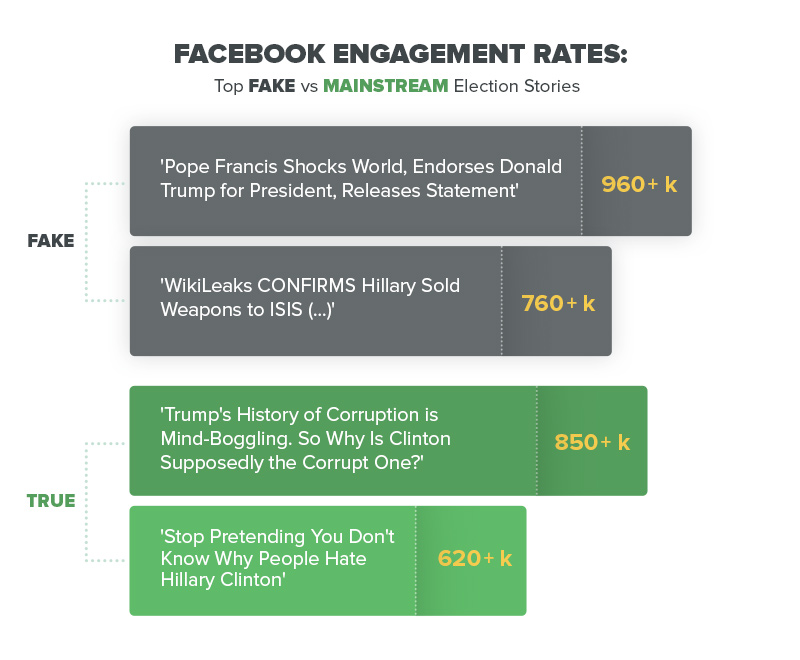 Â
Â
It is not enough just to spot fake news to avoid being mislead by the media. In the USA six big corporations own MSM (main stream media), such as CBS, NBC, FOX news, etc, so most of the media are not neutral to a certain extent, leaning either to a conservative, liberal, or leftist position. It is normal for news outlets to have different opinions but it might lead to a fact manipulation: biased doesn't mean fake yet, but it means you will get an event interpretation from a viewpoint of a particular media owner, reporter or editor. It turns out some people read news simply to confirm their own beliefs encouraging media to take sides. It is really hard to look at the facts from various perspectives but that's exactly why we need media literacy.
Ultimate guide to reading news in the era of clickbait
People like the flavor of bullsh*t, the aroma. It's very rare that people will stand for a complete lack of bullsh*t in anything.
James Randi
Â
Nope, Randi, not all of us like the âaromaâ, but we just have to accept it: the truth seekers and 'good guys' are not only ones who benefit from the freedom of speech, but there are crowds of cheaters willing to take advantage of it. Nobody's going to protect us for now, except for ourselves, although Mark is trying hard.
Â
We should learn how to create a better environment for us and the whole virtual community - it means taking part of the responsibility for spreading fake news, improving our level of media literacy, and avoiding sharing any suspicious content:
Â
1) Always look for the root source: find and follow the source link within an article - if you discover a tricky linking leading you from one low-value site to another, drill down until you find an original, credible source behind the news (for example, a .gov or .edu domain, a trustworthy media outlet, or a verified social media account). If the material originates from a foreign site, make sure to use an online translator to verify the story. News story that lacks any credible background is most likely fake.
Â
2) Check various news outlets for different coverage of the same events/stories - itâs always better to get information from a variety of trustworthy channels/pages/reporters with different points of view, and different experts involved into commenting or discussion. Here are a few more websites allowing you to fact-check with ease:
3) When it comes to breaking news, natural disaster reports, or sensational events, get back for updates at reasonable chunks of time, do not try to monitor the situation minutely - wait until you can get a more detailed and precise report.
Â
4) Separate facts from opinions: if you hear or see words like âbelieve, think, likely, maybe, probablyâ, remember that they mean an opinion or assumption. Donât rely on opinions - rely on facts, and facts have to be supported by credible sources, studies, links and firsthand interviews.
Â
5) Don't rely on a biased information. You can say that almost everything is somehow biased, and that's why you should learn to read between lines, and consider coverage of the same news from several sources. Pay attention to terms and ideas stressed out in a material: if a journalist/narrator is biased, his report or article tends to lead you to a particular point of view with the help of thoroughly selected words, visuals, and quotations. You may check the media bias ratings here.
Â
6) Remember that quantitative data looks more convincing, so it often falls victim to manipulation: sometimes hoaxers fill their pieces of content with proofless, misinterpreted or fake numbers just to throw dust in your eyes, and thus provide ârationaleâ for their false conclusions.
Â
7) Don't take headlines at their face value, especially if they appeal to strong emotions, i.e. make you feel worried, angry, frustrated, etc. - such headlines might be a clickbait, provoking you to click on them at any cost.
Â
8) Donât read news to confirm your own beliefs that makes you a perfect target for hoaxers and manipulators of all sorts.
Â
9) Don't share or like anything you haven't read till the very end. Reading the first two paragraphs of an article means not reading it at all. Donât âlikeâ or share news you don't consider trustworthy although the headline's so catchy. Verify news before spreading it.
Â
10) Use RSS reader for the sites that you already trust: most of trustworthy news outlets provide RSS subscriptions for those users who want to get all news in the right order - without omissions, and fake or promoted content included into the newsfeed, as it often happens in social media today.
Â
11) Pay attention to websiteâs design and URL: poor UI design may identify cheap fake sites; also, be careful with website addresses ending in something like com.co, or other multi-level or âexoticâ domains.
Â
12) Isnât it a joke after all? Are you sure itâs an evil fake or is it just a piece of political satire? Actually, comedy sites are not to be confused with false news sites, despite their potential to be misunderstood and shared as real life news by some people who may take everything too seriously when it comes to politics :)
 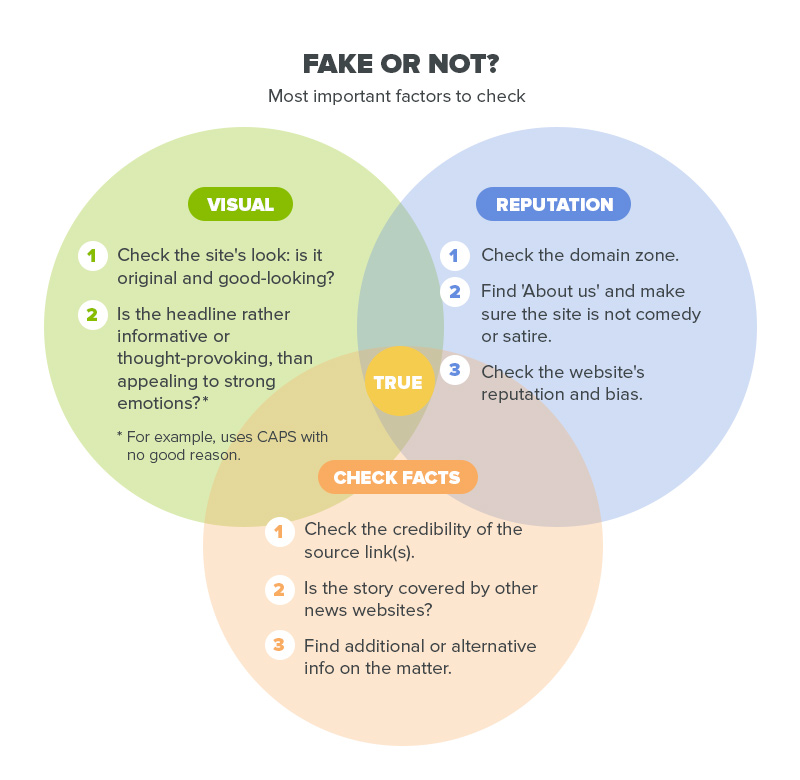
-
Information Overload vs Human Brain: infobesity causes, symptoms, and how to beat it.
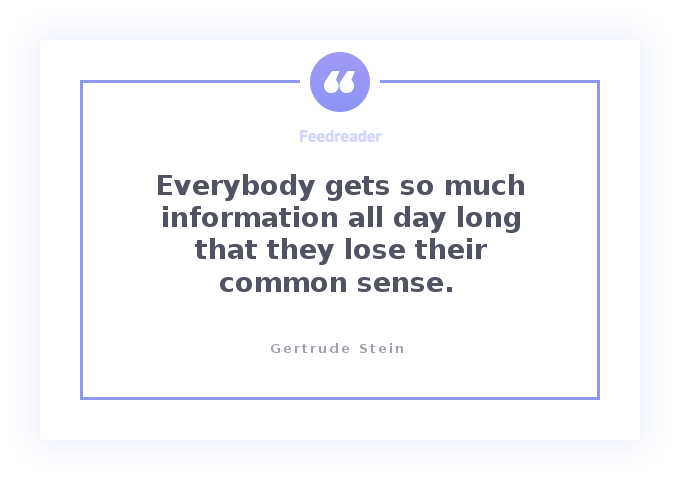
Itâs been a few decades since we were introduced to some iconic yet doubtful products of the modern accelerated lifestyle, including âfast foodâ and âfast carsâ (not to mention a pure disaster of âfast loansâ, of course). Then, some evil geniuses of IT made things even worse: they released a new plague - fast Internet connection! Itâs free, unlimited and gets you literally everywhere: on a bus stop, on a roadway, in your favourite coffee shop, in a park, hospital, school, library, restroom⊠and itâs ready to eat your brain hit you with the information anxiety syndrome making your life even more turbulent and hectic.
Â
Seriously though, the rapid technological progress just gives us another bunch of powerful tools to be used for either good or evil - you choose. So-called infoxication, infobesity or information overload is the dark side of staying online 24/7: your devices might be beeping, ringing, and vibrating all at the same time, many times a day, all day long - email notifications, social media updates, breaking news, working and personal messages keep coming nonstop (by the way, only 13% of US residents prefer to stay offline).
Â
Our mind struggles to absorb such a massive amount of information but fails somewhere in the middle of it: youâre getting tired, while switching between different sources/tabs/devices, and trying to process the abundance of information that pretends to be important or useful (in fact, it is not), and thus it becomes even harder for you to concentrate and differentiate what is really essential from unimportant or disturbing stuff.
 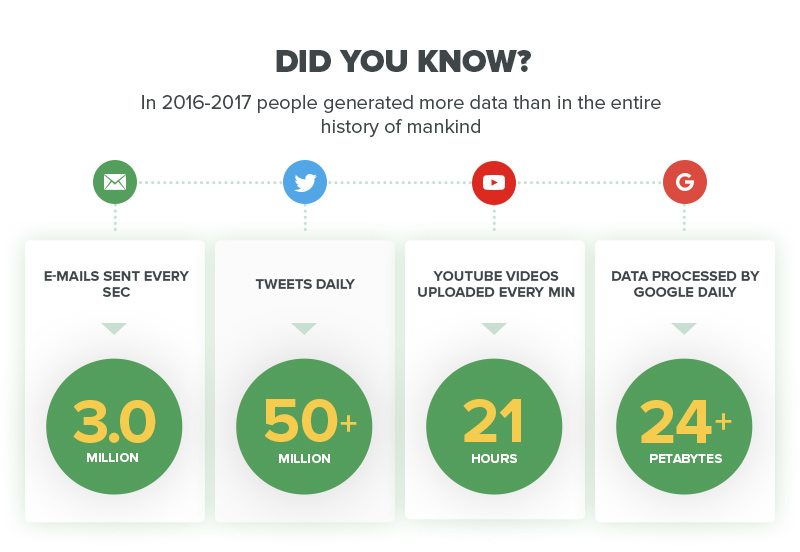 Â
Â
Irritation, disturbance, poor concentration, inability to make an informed decision - those are the main symptoms of 'information fatigue syndrome' and the cost of being constantly exposed to too much information. We may find it similar to the classic multitasking issue: heavy multitaskers can suffer a poor productivity, hurry sickness, and decreased cognitive ability. Managing several tasks at a time (e.g. scrolling down through a piece of content along with checking emails/messages on your phone) will definitely do no good to your learning capacity.
Â
It is not only the Web that causes infoxication - TV channels, radio stations, and outdoor advertising generate tons of informational noise. According to Daniel Levitin, a psychology professor at McGill University, âinfobesityâ symptoms can simply occur because of a growing variety of brand choices in our grocery stores today - there are almost 5 times more products on the shelves comparing to 1970s.
Information hygiene - how can it help? Â
One of the main infobesity reasons is information pollution and evolving from it âmulti-taskingâ (or heavily fragmented/mixed learning activity) leading to multiple distractions or context switching, which can quickly exhaust your brain, paralyze your movement towards important goals, and negatively affect your decision-making process.
Â
You can cope with the information pollution/overload problem by applying a few simple rules in your daily life. Itâs hardly possible to solve it radically (unless you're ready to live in a high-mountain monastery), but you can adhere to an information hygiene policy that would allow you to manage the incoming flow of information efficiently, and thus win extra time for self-development or spending it with your family and friends.
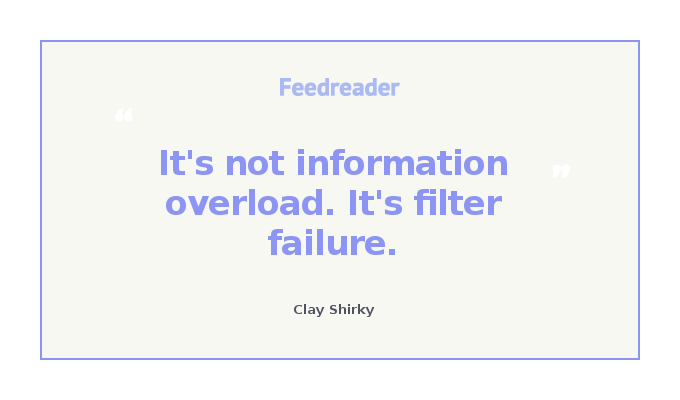
5 healthy habits of information hygiene
Â
1) Identify what info really matters to you in terms of personal and professional life, and get rid of everything excessive.
Â
We may find ourselves subscribed to dozens of news outlets which can daily flood us with a real tsunami of pushy yet useless content. Analyze your subscriptions (both RSS and social media) and find out which of them provide you with a duplicated, reused, or very similar content. You'll be surprised how easily you can cut off most of them and lose nothing at all.
Â
Withdraw news sources which are less original or profound (including those that are full of clickbait stuff); and yes, they may post useful info sometimes, but you shouldnât make your way through their conventional junk before finding a hypothetical âdiamondâ among it. Unfollow them and set yourself free!
Â
2) Schedule a particular time to check the news or email inbox. Follow your schedule and never go beyond: for example, you may spend an hour once a day (plus 10 minutes every next hour if necessary), to keep abreast of the situation. You must know that a frequent urge to check emails/messages is a symptom of infoxication, so you need to overcome it.
Â
3) Prioritize your information. There are always more/less important things in our life: define what's important to you at the moment, and get to that type of content first (you know, first things first). Otherwise, you might become âcontent friedâ - your attention and thoughts will begin to wander badly, instead of focusing on what is at hand.
Â
4) Ignore unnecessary information (learn to say âNOâ). First of all, take some âdays offâ during your week, when you minimize the time you spend online. For example, on weekends you may simply read NO news or business correspondence, postpone sending all non-urgent messages, avoid web-surfing, but youâd better focus on relaxation and having a good time with your family or friends.
Â
5) Organize your newsfeed and other information channels. Itâs always a very individual strategy, but you need to organize the incoming flow of information in a way that would let you check the essential matters at the first place (and remove all possible distractions), depending on your professional and personal situation.
Â
Feedreader Online users can categorize the feeds, and switch between these categories according to their relevance. Also, you can translate your social media updates into RSS, and then receive them in Feedreader Online, so that to minimize the influence of social newsfeed algorithms.
 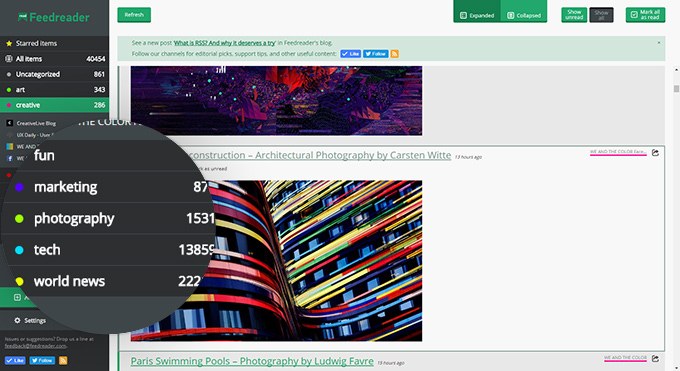
-
What is RSS? And why it deserves a try
A bit of explanation for RSS newbies: RSS stands for Rich Site Summary or Really Simple Syndication and means a web-based technology of delivering news of various kinds from their sources directly to the users, in the form of a simple feed - thatâs it!
Â
You can use an RSS reader of your choice to subscribe to your favourite sites, blogs, job listing portals, online shops, etc, and thus get all their news collected in one place. That would help you to keep abreast of the latest events, hot deals, digital media updates, and fresh articles without actually visiting all those websites one-by-one.
Â
How to subscribe? Itâs a cakewalk: there might be an orange button with a text suggesting that you âsubscribe via RSSâ on a site, but most of feed reading tools can automatically check a website to see if it syndicates an RSS channel and then you can go on by adding it to the subscriptions.
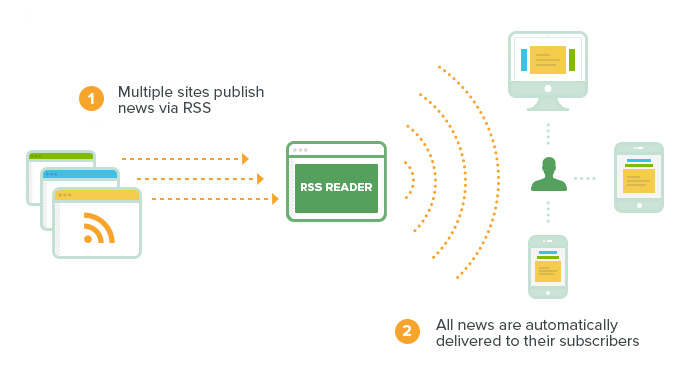
Why Social Media can never replace RSS
Today more people than ever get news from social networks and that might be an issue: the content of social media feed heavily depends on our (and our friendsâ) reactions and votes (i.e. likes, shares, reposts, etc), which is not bad at all, but it may lead to formation of so called âecho chambersâ keeping us within a narrowed and manipulated scope of interests, so it seems that we started to miss a lot at this point. Unlike most of the social networks, RSS does not include any mechanism that can automatically promote, filter or âmicro-targetâ certain content at a specific user according to trending opinions or his\her recent actions, location, and personal preferences.
Â
Itâs as simple as that â Really Simple Syndication. You only have to choose the resources and get the information youâre purely interested in, with no additional moderation or limitations, except for those you set yourself.
Â
RSS technology can boast of a few strong advantages over the social media (as a news source, of course), making it a favourable choice for users who still appreciate their personal freedom of choice:
- No ads or promoted content mixed into your newsfeed.
- No personal data tracking or questionable censorship policies.
- No deceptive SMM strategies or shady inner algorithms trying to take advantage of your attention.
- No issues with sudden account bans, fake users or dishonest reports.
Let us be clear: the point of social media is to create a safe environment for people to communicate (and they are pretty great at it), while RSS is a rather simple way to control the incoming flow of information and build a news digest with your own rules.
Â
Once you decide to give RSS a try, it won't take long to realize the benefits: you may save so much precious time and nerves by getting rid of all those useless content, rubbish clickbait, and annoying ads that are flooding the social media. With the help of feed readers (aka RSS aggregators) you can manage your news feeds wisely and focus on things that really matter.
How to keep the Simple Syndication really simple
If you feel excited about the ideas of RSS, and would like to follow a few worthy sites, then you should begin the journey with signing up for a nice feed aggregator.
Â
We at Feedreader believe that simplicity is the key virtue of RSS, so we created Feedreader Online that lets you check the news on the go, without hassle, personal data collection or overwhelming functionality.
Â
Here are some Feedreader Online features for you to enjoy RSS:
- Radically simplified and streamlined user interface.
- Easy to sign up and use (no need to read any lengthy manuals).
- Clean and uncluttered view: no banner ads or promoted content.
- Safe and anonymous usage: keep all your personally identifiable info to yourself + benefit from https encrypted data transmission.
- Responsive support service providing timely assistance to everyone.
- Free of charge for all users.
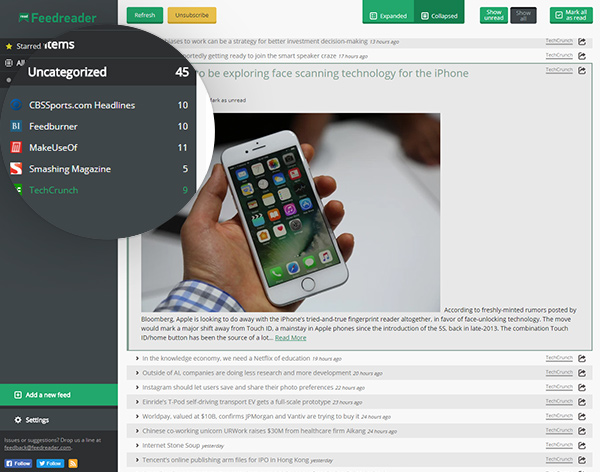
Feedreader Online keeps managing the newsfeeds ultimately simple and makes your reading experience really pleasant, so youâll be âŠ.
Never fed up with feeds
There are more of great RSS reading tools out there, including free and paid solutions, but just a few provide additional services that can be of use without even starting an account with them.
Â
We talk about Feedreader Observe: this tool lets you discover new RSS channels, top stories and alternative media choices with no registration. Youâll just need to copy & paste the link into the directoryâs search bar to get a preview of any websiteâs feed (if it syndicates any), and check their status, reputation plus some other analytical data.
 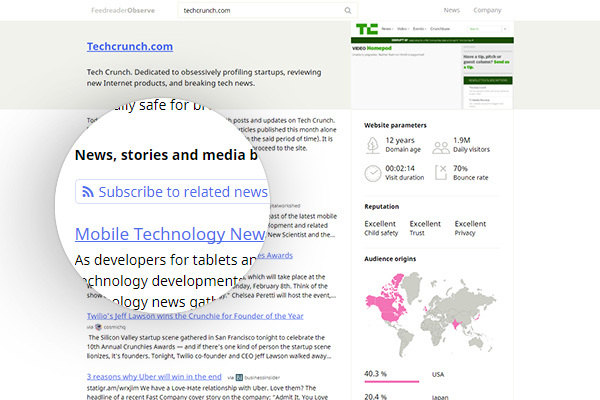
-
Meet the Feedreaderâs news observing service!
After a few months of hard work and dedication, we are delighted to announce that the instant news observer from Feedreader is available at feedreader.com/observe.
Â
We hope you will love this new service that lets you research and observe website news, stories and media buzz based on your own choice without subscribing to every particular site (once you find a good source you may click âSubscribeâ button to add it to your Feedreader Online).
Â
Here are a few examples of news profiles you may start with: Make Use Of, Business Insider, CBS Sports.
Â
It helps you preview any siteâs RSS digest + find alternative news/feed sources for a wider range of media opportunities and choices; it also features a few important analytical and safe browsing options to make sure you can keep abreast of reputation, availability, and attitudes of every site/source you might subscribe to.
-
Feedreader website goes fresh, clean and mobile
Our team has recently renovated the Feedreader websiteâs UI in order to streamline and adapt it for mobile devices. We hope you will love our new elegant and modern look!
-
Get ready for the news observer by Feedreader!
Just imagine a service, which on the one hand lets you preview any siteâs RSS feed without even subscribing to it in Feedreader Online, and on the other hand helps you broaden your horizons by suggesting some alternative news sources.
Â
Such a âquick viewâ service would allow you not only to check the availability or activity of a certain websiteâs RSS feed (to make sure itâs not broken or outdated) before adding it, but also to find and observe more feeds\news related to similar subjects. Feedreader team is on its way to launching such an instant feed observer in early 2017, so stay tuned!
-
We are glad to present Deets Feedreader!
Feedreader has proudly expanded its platform with a new service - Deets Feedreader!
Â
We take the challenges of user safety very seriously and thatâs why we decided to start a free service that would allow you guys to check the websitesâ statuses (e.g. 'live' or 'stale', safe or dangerous) before subscribing to their RSS feeds.
Â
Here we go: Deets Feedreader is intended to help you delve into any websiteâs most important details, such as the most visited pages, safety insights, traffic stats, Whois lookup, preferred language, and more. It allows you to check all 'deets' in one place (and in a single click!) - just enter an URL and discover everything we managed to learn about that site.
 Haberler
Haberler  Haberler
Haberler